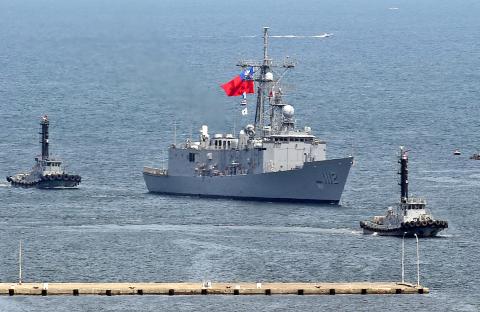The Ministry of National Defense plans to spend more than NT$1.1 billion (US$36 million) to build three special operations and counterterrorism bases over three years for use by the navy and the military police, the ministry’s budget for next year showed.
The navy is to build a multifunctional special operations training base for NT$698.04 million and a maritime special operations training base for NT$134.25 million, while NT$269.21 million has been reserved for a joint special operations training base for the military police, the document said.
The multifunctional base, which is to be equipped with computers that can simulate training scenarios, is slated for use by the Special Service Squadron of the marine corps’ Amphibious Reconnaissance and Patrol Unit, it said.

Photo: Chang Chia-ming, Taipei Times
The program is to have a NT$11.42 million budget next year and base construction should be completed in 2022, it said.
The maritime base is to be used for improving formational and individual combat skills, as well as enhancing amphibious assault and special operations capabilities, it said.
The base is to have facilities for air insertion training and hostage rescue drills on ships, vehicles and airplanes, it said, adding that the base could accommodate the training needs of other military units.
The ministry is to spend NT$4.51 million constructing the maritime base next year and completion is scheduled for 2021, it said.
The joint training base is slated for use by the military police, which has an important role in the defense of Taipei, security operations and urban warfare.
The base is to be capable of simulating conventional military combat, as well as special operations in modern built-up areas, for training of military and regular police units, it said.
The joint training base is to be allotted NT$2.12 million for the portion of the program scheduled for next year and is expected to be completed in 2022, it said.
Separately, the navy next month is to commission two Perry-class guided missile frigates that were bought from the US.
Navy Chief of Staff Vice Admiral Lee Tsung-hsiao (李宗孝) yesterday told the legislature that training and preparations are under way for the commissioning of the two vessels.
When asked how the ships would improve the nation’s defense capability, Lee said that the Perry-class’ anti-submarine capabilities are superior to those of the navy’s eight Cheng Kung-class frigates.
The two frigates, built in the 1980s and named the USS Taylor and USS Gary by the US Navy, were delivered in May last year.
Renamed Ming Chuan (銘傳) and Feng Chia (逢甲), they are to join the navy’s 146th Fleet based in Penghu and would be deployed on patrols in the Taiwan Strait, the navy said.
The vessels are highly mobile and equipped with SQQ-89 undersea warfare combat systems and SQR-19 sonar systems, both of which the navy said would bolster their anti-submarine capabilities.
In December 2014, then-US president Barack Obama authorized the sale of four Perry-class frigates to Taiwan.
The government allocated about NT$5.5 billion for the purchase of two of the ships.

CHAOS: Iranians took to the streets playing celebratory music after reports of Khamenei’s death on Saturday, while mourners also gathered in Tehran yesterday Iranian Supreme Leader Ayatollah Ali Khamenei was killed in a major attack on Iran launched by Israel and the US, throwing the future of the Islamic republic into doubt and raising the risk of regional instability. Iranian state television and the state-run IRNA news agency announced the 86-year-old’s death early yesterday. US President Donald Trump said it gave Iranians their “greatest chance” to “take back” their country. The announcements came after a joint US and Israeli aerial bombardment that targeted Iranian military and governmental sites. Trump said the “heavy and pinpoint bombing” would continue through the week or as long

TRUST: The KMT said it respected the US’ timing and considerations, and hoped it would continue to honor its commitments to helping Taiwan bolster its defenses and deterrence US President Donald Trump is delaying a multibillion-dollar arms sale to Taiwan to ensure his visit to Beijing is successful, a New York Times report said. The weapons sales package has stalled in the US Department of State, the report said, citing US officials it did not identify. The White House has told agencies not to push forward ahead of Trump’s meeting with Chinese President Xi Jinping (習近平), it said. The two last month held a phone call to discuss trade and geopolitical flashpoints ahead of the summit. Xi raised the Taiwan issue and urged the US to handle arms sales to

BIG SPENDERS: Foreign investors bought the most Taiwan equities since 2005, signaling confidence that an AI boom would continue to benefit chipmakers Taiwan Semiconductor Manufacturing Co’s (TSMC, 台積電) market capitalization swelled to US$2 trillion for the first time following a 4.25 percent rally in its American depositary receipts (ADR) overnight, putting the world’s biggest contract chipmaker sixth on the list of the world’s biggest companies by market capitalization, just behind Amazon.com Inc. The site CompaniesMarketcap.com ranked TSMC ahead of Saudi Aramco and Meta Platforms Inc. The Taiwanese company’s ADRs on Tuesday surged to US$385.75 on the New York Stock Exchange, as strong demand for artificial intelligence (AI) applications led to chip supply constraints and boost revenue growth to record-breaking levels. Each TSMC ADR represents

State-run CPC Corp, Taiwan (CPC, 台灣中油) yesterday said that it had confirmed on Saturday night with its liquefied natural gas (LNG) and crude oil suppliers that shipments are proceeding as scheduled and that domestic supplies remain unaffected. The CPC yesterday announced the gasoline and diesel prices will rise by NT$0.2 and NT$0.4 per liter, respectively, starting Monday, citing Middle East tensions and blizzards in the eastern United States. CPC also iterated it has been reducing the proportion of crude oil imports from the Middle East and diversifying its supply sources in the past few years in response to geopolitical risks, expanding